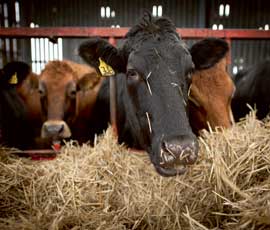EU trade agreement to cause farm incomes to fall

Beef prices across Europe could slump by up to 8% if plans to reduce trade barriers between the European Union and South America get the go-ahead.
Farmers across the whole agricultural industry could see their incomes drop by more than 3% if a trade deal was agreed with the Mercosur group of South American countries.
The findings, published in a draft report by EU farm experts DG Agri, were the “toughest scenario” of the effects of the proposed Mercosur deal, which would give Brazil, Argentina, Uruguay and Paraguay preferential access to EU markets.
Carried out by the Joint Research Centre of the European Commission, the draft analysis outlined the possible effects of the free trade deal on EU meat, dairy, cereal, fruit and vegetable sectors.
It said adoption of the latest Mercosur proposal, which was put forward in 2006, combined with EU concessions in the latest Doha Round of world trade talks would cause “significant negative impacts” across all agricultural sectors.
But it was the beef sector that would be most seriously affected, with production predicted to fall by as much as 150,000 tonnes.
Under the proposals, which would see preferential tariffs on beef, poultry and pork imports, the report said EU meat production value could fall by almost €3bn, while overall agricultural incomes could drop by 3.2%.
In other sectors, production of skimmed milk powder would drop by more than 60,000 tonnes, while EU sugar production would slump by 16% if the trade plans were adopted, the report said.
EU sources said the draft aimed to inform experts of the technical aspects of the assessment of the deal, ahead of the full report being made to the EU Trade Policy Committee in the coming weeks.
They added that the re-launched 2010 Mercosur trade talks were also based on a 2004 proposal, which saw less of a cut in tariffs.
The draft’s publication on Wednesday (28 April) came as a separate DG Agri trade impact assessment said there was a “sizeable net gain” for the EU economy if a trade deal with Mercosur was agreed.
While it recognised the challenges to agriculture, it said European industrial exports would “increase sharply”, with “major gains” in sectors such as cars, telecommunications and services.
Earlier this month, farm ministers expressed strong misgivings towards the ongoing Mercosur talks, with France, Italy, Austria, Greece, Romania, Poland, Belgium, Slovenia and Portugal demanding a “careful approach”.
European farm commissioner Dacian Ciolos said the next round of trade talks with Mercosur in Paraguay at the beginning of May would be an opportunity to test “reciprocal ambitions”.
